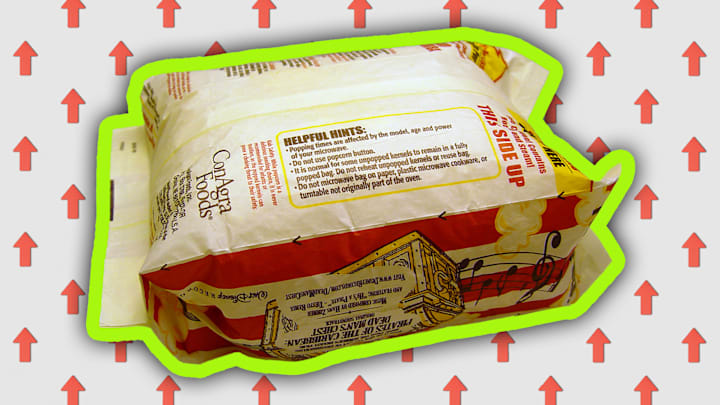Microwave popcorn bags are pretty direct in their messaging. You’re told to be cautious because the bag is hot. You’re told where to pick it up in order to avoid getting burned, and you’re told which side to open. It’s all relatively intuitive—with the possible exception of “This Side Up.”
Clearly, popcorn kernels aren’t like pizza, Pop-Tarts, or any other food with a distinct top and bottom that could get mangled if you cooked the item upside-down. So why would it matter which side of the popcorn bag is facing up?
Because of what’s called a susceptor, which is basically a metallic patch that absorbs the microwave energy and converts it to heat. Microwave popcorn’s susceptors often go unnoticed, because they’re inside the bags. But you may recognize a susceptor’s characteristic silver coating from other microwaveable products—like Hot Pockets, whose susceptors are known as crisping sleeves.

When a popcorn bag is placed in the microwave with the correct side up, the susceptor is on the bottom—and so are the kernels, meaning they’ll heat up and pop faster. In the words of artisanal popcorn brand Kettle Heroes, “Positioning the kernels over the susceptor maximizes the popping. The amount of popped kernels in your bag of popcorn will be somewhat reduced if you turn the bag upside down, but that won’t affect the taste.”
YouTubers TKOR and Mad Scientist both tried microwaving popcorn with the wrong side of the bag facing up and didn’t see any meaningful difference in the results. Food writer Kimberly Holland, on the other hand, did feel like the upside-down bag underperformed its “This Side Up” counterpart. “I found it took a few seconds longer for the kernels to start popping. The bag was less full at the end of the popping time,” she wrote for Allrecipes. “Also, the upside-down bag never reached a rolling popping cadence. It sounded as if the popping was a bit haphazard, though it did pop plenty enough kernels for a snack.”
Haphazard popping could pose a problem for people who use the tried-and-true method of stopping the microwave when the popping slows to one pop every couple seconds or so. If it never reaches a rolling cadence in the first place, it might be harder to determine when the popping is actually slowing down.
